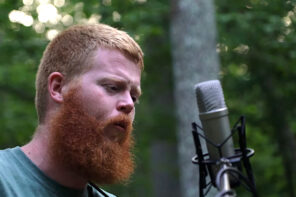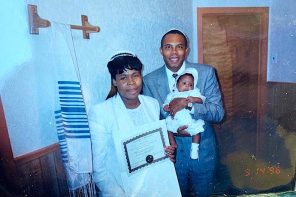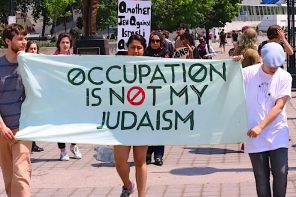In the world of hipster Judaism, this is big news. Herewith the note, posted today, by Matisyahu, who rose to fame several years ago as, yes, a “Chassidic reggae superstar.” But no more. Matisyahu writes:
This morning I posted a photo of myself on Twitter.
No more Chassidic reggae superstar.
Sorry folks, all you get is me…no alias. When I started becoming religious 10 years ago it was a very natural and organic process. It was my choice. My journey to discover my roots and explore Jewish spirituality—not through books but through real life. At a certain point I felt the need to submit to a higher level of religiosity…to move away from my intuition and to accept an ultimate truth. I felt that in order to become a good person I needed rules—lots of them—or else I would somehow fall apart. I am reclaiming myself. Trusting my goodness and my divine mission. Get ready for an amazing year filled with music of rebirth. And for those concerned with my naked face, don’t worry…you haven’t seen the last of my facial hair.– Matisyahu
Matisyahu’s statement has still not been digested over in the Jewish world, but its form is familiar to all of us — this writer included — who took on Orthodox Jewish practice for a time, and then moved away from (I won’t say “beyond”) it.
It may also be familiar to music fans — wasn’t it John Lennon who sang, in the aptly titled track “God,” that he no longer believed in any number of transcendent values, from Jesus to the Beatles, that “I just believe in me / Yoko and me / and that’s reality”? As Lennon also sang, the dream is over — in this case, that of a fully engaged, in-the-world Hasid who runs with the Crystal Method but davens three times a day.
Of course, for dyed-in-the-wool Orthodox Jews, Matisyahu was never as authentic as he may have seemed to outsiders. For one thing, he was a baal tshuvah, someone who takes on religious practice but was not raised Orthodox. Matisyahu’s latest decision reinforces the nasty stereotypes that “frum from birth” people have long held about newly religious ones.
Second, Matisyahu’s brand of Hasidism was Chabad, which, as the joke goes, is the religion closest to Judaism. Chabad’s messianism, its proselytization (to Jews only), its open mysticism, and its tendency to fear modernity less than other Hasidic groups have all caused the group to be held in suspicion in traditional quarters.
And of course, Matisyahu was crossing boundaries even before he fell “off the derech,” i.e. out of the traditional Jewish way of life. True, he never performed on shabbos. But cavorting with hip hop and reggae artists, groupies, and the whole lifestyle of being a pop star was always at odds with the hyper-modest, hyper-conservative world of which Matisyahu may have seemed to be a part.
Of course, we shouldn’t assume too much. The shaving of the beard does mark a clear break (for now) with Hasidism, but not necessarily with traditional Judaism. We don’t know where Matisyahu — born Matthew Miller — is headed next. Probably he doesn’t know yet himself.
But coming on the heels of the closing up of JDub, the independent Jewish record label which launched Matisyahu’s career, it does feel like the end of a chapter in American Jewish life. And I worry, frankly, that it casts suspicion on all of us who are working to create a more pluralistic, creative, open Jewish community. “See!”our doubters can now say. Sigh.
Personally, though, my main reaction is not one of fear or regret. I could’ve written exactly the same statement Matisyahu just put out when I drifted away from Orthodox Jewish practice a decade ago. My Orthodox spirituality was very similar to Matisyahu’s: it delivered the goods, which I interpreted as a sense of closeness with God, or living in a worthwhile way, or being connected to my deeply-held values. But it did so conditionally. Everything was good IF I fulfilled my end of the deal.
To be sure, this is a fundamental traditional Jewish value; it’s the root of covenantal theology. You do your part, God does His (and in that theology, it is His). Stay faithful to God, the crops will grow. Falter, and they won’t. But I don’t mean to suggest that such theologies are naively about reward and punishment. They’re not. When I was living an Orthodox life, I didn’t have any such ideas. Rather, I thought that if I observed the commandments, I would remain connected to what mattered to me: to mysticism, to ethical values, to community. If, if, if. The reality is, as Matisyahu describes, that I have all those connections now, without the strictly Orthodox life. (Even today, I still observe the mitzvot more thoroughly than about three-quarters of American Jews.) In fact, the connections are stronger, because they’re not conditioned on my fear-based observance of this or that precept. In other words, I feel like I know exactly where Matisyahu is coming from.
Seven and a half years ago, I wrote the first news article about Matisyahu, in the Forward newspaper. Yet I don’t feel that I’m writing the last one now. Moving beyond — yes, beyond — traditional religious norms need not be the end of one’s spiritual or religious journey. If you’re reading this, Matisyahu, or Matt, or by whatever new name this newly strong self is to be known, let me be the first to welcome you home.




